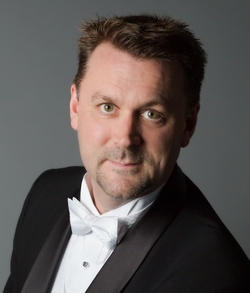Some rough edges apart, Boston Cecilia continues its long tradition with Handel and Mozart

Nicholas White conducted Boston Cecilia Friday night at Jordan Hall.
Boston Cecilia has a rich and storied history. Founded in 1876, Boston Cecilia introduced several large-scale choral works to Boston audiences, not least Bach’s Mass in B minor and Brahms’ German Requiem. Cecilia also gave the Boston premiere of Beethoven’s Missa Solemnis and Dvořák’s Requiem, the latter led by the composer himself. Long a champion of contemporary music, the society sang the choral part in the American premiere of Stravinsky’s Symphony of Psalms with the Boston Symphony Orchestra under Serge Koussevitzky’s direction.
Following World War II, Boston Cecilia continued but strong, fresh direction was provided in 1968, when Donald Teeters, the society’s longest serving conductor, took the reins. While continuing Cecilia’s tradition of presenting both old and contemporary works, Teeters blazed a new path by reintroducing Boston audiences to music of Bach and Handel on period instruments, making it one of the first organizations in the city to do so.
Friday night’s season opening concert at Jordan Hall, which featured works by Handel and Mozart, returned Boston Cecilia to this tradition.
The sixty-member chorus, led and prepared by Nicholas White, sings with a smooth vocal blend and crisp, percussive diction, and the two works heard Friday night showcased the group’s broad interpretive powers.
Handel composed Dixit Dominus, which filled the first half of the concert, when he was 22 years old. Scored for soloists, chorus, and strings, the nine-movement piece is a setting of Psalm 110. Though a young man, the composer was already adept at writing powerful choral numbers that would characterize his mature oratorios. Vocal lines whiz by in florid melismas, and declamatory passages sound with religious fervor. “Handel understands effect better than any of us,” Mozart wrote. “When he chooses, he strikes a thunderbolt.”
Mozart’s music is, of course, equally dramatic, and his Davide Penitente, which made up the second half of the concert, is such an example. Completed in 1785, this ten-movement setting of the Psalms of David reuses the Kyrie and Gloria from the composer’s unfinished “Great” Mass in C minor, K. 427. Fresh solos for soprano and tenor fill out the piece. Its Italian text was long thought to have been adapted from the bible by Lorenzo Da Ponte, though scholarship has determined that the Neapolitan poet Saverio Mattei made the translation. Mozart lovers will also note that the work abounds in similar operatic lyricism and dark tragedy that the composer would mine in his unfinished Requiem.
In both pieces, Nicholas White drew clear, smooth lines from the chorus. The ensemble is particularly strong in its low voices, and while not exactly weak, the sopranos had trouble executing Handel’s tricky counterpoint with the requisite intensity. Elsewhere, though, the ensemble was capable of rich resplendence. “Juravit Dominus” from Dixit and the stark chorus “Se vuoi, puniscimi ma pria, Signore,” from Mozart’s work sounded with righteous anger and penitence.
The soloists, for the most part, were excellent. Countertenor Daniel Roihl sang with a soft, fruity tone in Handel’s aria “Virgam virtutis tuae,” his high notes ringing clearly in the hall. Bass Charlie Evett, who sang with a wide vibrato, had trouble pulling off the vibrancy of Handel’s trickling line in “Dominus a dextris tuis.”
The tenor and soprano soloists fared best. Alexander Nishibun sang with a bright, smooth-toned voice and diction of spring-water clarity in his solo aria from Davide, “A te, fra tanti affanni,” taking care to shape his phrases in beautiful arcs. Sarah Yanovitch brought bell-toned resonance and operatic weight to Mozart’s “Tra l’oscure ombre funeste,” and Clara Rottsolk, filling in last minute for an ailing Emily Noël, sang with dark radiance in Handel’s “Tecum principium” and Mozart’s “Lungi le cure ingrate.”
In Dixit Dominus Handel proves a master of using harmonic suspensions for dramatic effect, and his “De torrente in via bibet,” which featured both sopranos, was the musical highlight of the evening. There, the ear-tingling dissonances sung by Yanovitch and Rottsolk sounded with sweet, palpable sorrow. The trio for sopranos and tenor in Davide was a study in elegance. Yanovitch’s bright lines complemented the dark, yearning statements sung by Rottsolk and Nishibun.
The orchestra, which consisted of some of the best period instrumentalists in Boston, had a few rough edges in Mozart’s Davide, grinding out of tune in one brief moment and the texture suffered from a few tenuous attacks in another. But those moments were rare, and the orchestra sounded with vibrancy and intensity in Handel’s Dixit and in the robust sections of Davide. Cellist Guy Fishman, bassist Erik Higgins, and organist Barbara Bruns supplied sturdy continuo support.
Nicholas White will lead Boston Cecilia in Christmas Concerts 8 p.m. December 2 at Church of the Advent and 3 p.m. December 4 at All Saints Parish, Brookline. bostoncecilia.org; 617-232-4540.
Posted in Performances